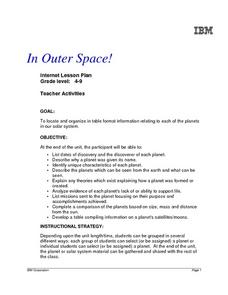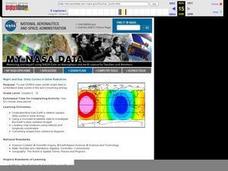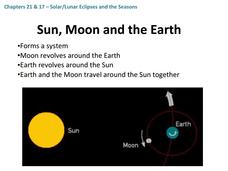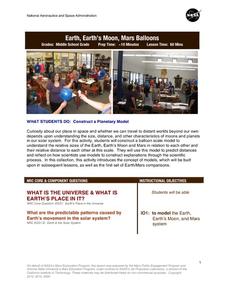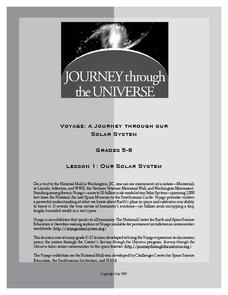Curated OER
Finding Out About the Stars and Planets
Learners complete a web-based activity to study the planets and solar system. Students complete a number of activities including a slide show that depict the true facts about planets.
Curated OER
Star Child Astronomy
Students gain understanding of the relationship of Earth within the Solar System. They increase knowlegde of the planets, sun, moon, meteoroids, asteroids and comets.
Curated OER
Puzzling Planets
Students examine the concept of a solar system. In this research based lesson, students compare a star and a planet. They explain the requirements for life in a biosphere.
Curated OER
The Magic School Bus Lost in Space
Students identify the planets by making two models of the Solar System. They create a model that shows the order of the planets and a model that shows the planets sizes as compared to one another. They may write about the planet they...
Curated OER
Scavenger Hunt: Who am I?
In this space science worksheet, learners use the sites listed on the Solar System and Planets page of the Kid Zone to locate the names of the people credited with each discovery. They identify and name 26 different scientists who made...
Curated OER
In Outer Space
Students use the internet to gather information on the solar system. They identify the discoverer and unique characteristics of each planet. They compare and contrast each planet based on size, mass, and distance from the sun. They...
Curated OER
The Magic of Solar Thermal: How the Sun Can Be Used to Heat Water
Students are introduced to how the sun is used to heat water. In this solar lesson students identify the different types of solar water heating and demonstrate how it works.
Curated OER
NIGHT AND DAY: DAILY CYCLES IN SOLAR RADIATION
High schoolers examine how Earth's rotation causes daily cycles in solar energy using a microset of satellite data to investigate the Earth's daily radiation budget and locating map locations using latitude and longitude coordinates.
Laboratory for Atmospheric and Space Physics
Where Are We Going?
Come take a ride on the space bus! Scholars go on an imaginary trip to pick up their peers from the inner and outer planets while reinforcing math skills. First, learners round decimals to identify each planets' distance from Earth....
Curated OER
Solar/Lunar Eclipses and the Seasons
How do the moon, sun, and Earth line up to create eclipses? Why do the seasons change throughout a year? The answers to these questions are explained through this series of slides. This apt presentation outlines information using bullet...
Columbus City Schools
Moon Phase Mania
Now you see it, now you don't. Our moon seems to pull a disappearing act from time to time—but why? Take your seventh grade scientists above and beyond to discover the truth about the moon and the role it plays in Earth's little corner...
University of Colorado
The Moons of Jupiter
Can you name the three planets with rings in our solar system? Everyone knows Saturn, many know Uranus, but most people are surprised to learn that Jupiter also has a ring. The third in a series of six teaches pupils what is around...
California Academy of Science
Modeling Eclipses with Size and Distance Scales
Size within the solar system is a difficult thing for pupils to imagine. Using everyday objects, they build models to show the scale between the sun, moon, and Earth. They situate their props in proportional distances between the objects...
Curated OER
The Earth
Third graders examine the relationship between the Earth and the Sun. They define key vocabulary terms, and in small groups conduct Internet research, exploring a variety of websites. Students answer comprehension questions, and...
Curated OER
Olympic Solar Energy
Students use cardboard and aluminum foil to construct a solar oven that concentrates enough sunlight to cook a hotdog. They review the history and use of solar energy in relation to the Olympics.
Curated OER
Jupiter
A student-produced PowerPoint provides basic facts about the planet of Jupiter. Illustrated slides highlight its physical attributes and satellites. A lot of interesting information about Jupiter is included, such as the fact that twenty...
NASA
Earth, Earth’s Moon, Mars Balloons
Very specific diameters are given for blowing up three different balloons to represent, in scale, the moon, Earth, and Mars. In groups of three, amateur astronomers explore scale measurements and distance in space.
Curated OER
Astronomy Test
In this astronomy test, students answer 50 true/false and multiple choice questions about the relationships of the earth, moon, and sun. The test also includes questions about the solar system, galaxies, and the universe. An answer key...
Curated OER
Planets Curriculum
Students investigate the planets in our solar system. They conduct research using a variety of resources in order for students to make cognitive connections with the demonstrations made by the teacher. Students discover how to recognize...
Curated OER
Planets Curriculum
Students complete an in-depth study of the known planets in the solar system. As a class, students identify the planets that are known in the universe, in the night sky. They explain the differences between planets and stars and the...
Curated OER
Earth Turns? Prove It!
Young scholars construct a pendulum using a washer and thin fishing line. In this earth science lesson plan, students simulate Earth's rotation using the pendulum bob and swivel chair. They explain how this activity proves that the Earth...
Curated OER
Our Solar System
Students explain the classification of planets according to various criteria. They create charts illustrating comparative data.
Curated OER
Making Regolith
You may not be able to take a field trip to the moon, but that doesn't mean your class can't study moon rocks. Using graham crackers as the moon's bedrock and powdered donuts as micrometeorites, young scientists simulate the creation of...
Curated OER
What's "In" There: A Study of the Inner Planets - Mercury, Venus, Earth, and Mars
First graders identify and explore the four inner planets. For this planet science lesson, 1st graders watch a PowerPoint about the planets. Students read the book Our Solar System and discuss the inner planets. Students create a book...







